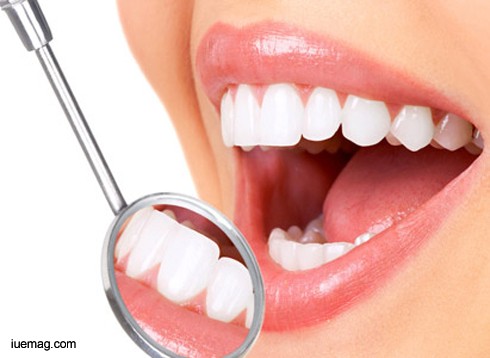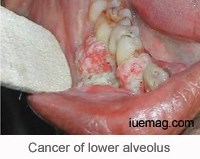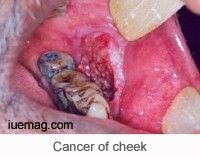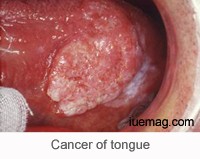

Oral Cancers - Diagnosis and its Management
Oral cancers include cancers of the: lips, tongue, cheek, Gingiva (gums), floor of the mouth, hard and soft palate, Lower alveolus.
RISK FACTORS:
One of the biggest risk factors for oral cancer is the illicit use of tobacco. This includes smoking and chewing tobacco, betel nut and supari.It is also caused by Alcohol use. People who consume large amounts of alcohol and tobacco are at an even greater risk, especially when there is combination of these two products on a regular basis.
Other risk factors include:
- Human Papiloma Virus infection (a sexually transmitted virus)
- chronic facial sun exposure causing Basal cell carcinoma
- a family history of oral or other types of cancer
What are symptoms of oral cancer? - An ulcer on your lip or mouth that is not healing till 2 weeks
- a mass or unusual growth anywhere inside oral cavity
- bleeding from the oral cavity
- loose teeth
- pain or difficulty while swallowing food
- trouble wearing dentures
- Lump or mass in neck
- Persistent earache
- dramatic weight loss
- lower lip, face, neck, or chin numbness
- white, red and white, or red patches in oral cavity.
If you have any of these symptoms, for more than 2 weeks then you must visit a head and neck cancer surgeon or a dentist as soon as possible.
RISK FACTORS:
One of the biggest risk factors for oral cancer is the illicit use of tobacco. This includes smoking and chewing tobacco, betel nut and supari.It is also caused by Alcohol use. People who consume large amounts of alcohol and tobacco are at an even greater risk, especially when there is combination of these two products on a regular basis.
Other risk factors include:
- Human Papiloma Virus infection (a sexually transmitted virus)
- chronic facial sun exposure causing Basal cell carcinoma
- a family history of oral or other types of cancer
What are symptoms of oral cancer? - An ulcer on your lip or mouth that is not healing till 2 weeks
- a mass or unusual growth anywhere inside oral cavity
- bleeding from the oral cavity
- loose teeth
- pain or difficulty while swallowing food
- trouble wearing dentures
- Lump or mass in neck
- Persistent earache
- dramatic weight loss
- lower lip, face, neck, or chin numbness
- white, red and white, or red patches in oral cavity.
If you have any of these symptoms, for more than 2 weeks then you must visit a head and neck cancer surgeon or a dentist as soon as possible.

DIAGNOSIS:Your head & neck cancer surgeon or dentist will perform a clinical examination. This includes thoroughly examining the roof and floor of your oral cavity, the back of your throat, tongue, and cheeks, and palpating the lymph nodes in your neck on both the sides.If your surgeon finds any tumors, growths, or suspicious lesions, they will perform a punch biopsy . A punch biopsy involves removing a piece of the tissue so it can be examined under a microscope for cancerous cells.
In addition, your doctor may perform one or more of the following tests:
- OPG (Orthopantomogram) to check the status of hard tissues inside the oral cavity
- CT Neck/thorax scan to reveal any tumors in your oral cavity , throat, neck and lungs
- PET scan to determine if the cancer has spread to lymph nodes or other organs in the body
- MRI scan to show a more accurate image of the head and neck, and determine the extent or stage of the cancer
- endoscopy to examine the nasal passages, sinuses, inner throat, windpipe, and trachea
STAGES OF CANCER:There are four stages of oral cancer based on dimensions of the tumor, lymph node spread in the neck and spread to other parts of the body. Stages 1 and 2 usually involve a small tumor. In these stages, cancer cells have not spread to the lymph nodes. Stages 3 and 4 are considered advanced stages of cancer. In these stages, tumors are large and the cancer cells have usually spread to the lymph nodes or other parts of the body.
The survival rate after one year for all stages of oral cancer is 81 percent. After five years, the survival rate is 56 percent, and after 10 years it’s 41 percent. The earlier the stage at diagnosis, higher is the chance of survival after treatment. This makes timely diagnosis and treatment all the more important.
TREATMENT:Treatment for oral cancer will vary depending on the type, location, and stage of the cancer at diagnosis.Treatment for early stages usually involves surgery to remove the tumor with minimum 1 cm clear margins and lymph nodes. In addition, other tissue around the oral cavity and neck may be taken out.
Radiation therapy is another option which involves a radiation oncologist aiming radiation beams to the tumor site along with neck once or twice a day, five days a week, for six weeks. Treatment for advanced stages will usually involve a combination of radiation therapy and chemotherapy
Chemotherapy is treatment with drugs that kill cancer cells. The chemotherpeutic drug is given to you through an intravenous (IV) line. Most people get chemotherapy on an outpatient basis, although some require hospitalization.
Targeted therapy is another form of treatment. It can be effective in both early and advanced stages of cancer. Targeted therapy drugs will bind to specific proteins on cancer cells and interfere with their growth.
Nutrition is also an important part of your oral cancer treatment. Many treatments make it difficult or painful to eat and swallow, and poor appetite and weight loss are common. Getting the advice of a nutritionist can help you plan a food menu that will be gentle on your mouth and throat, and will provide your body with the calories, vitamins, and minerals it needs.
The recovery from each type of treatment will vary. Post-operative symptoms can include pain and swelling, but removing small tumors usually has no associated long-term problems. The removal of larger tumors could possibly affect your ability to chew, swallow, or talk as well as you did before the surgery. You might also need reconstructive surgery to rebuild the bones and tissues in your face removed during surgery. Radiation therapy can have a side effect on the body. Some of them are: sore throat or mouth, dry mouth and loss of salivary gland function, dental decay, nausea and vomiting, sore or bleeding gingiva, skin and mouth infections, jaw stiffness and pain, problems wearing dentures, fatigue, change in your ability to taste and smell, changes in skin, including weight loss, dryness and burning, and thyroid changes.
Chemotherapy drugs can be toxic to rapidly growing non-cancerous cells. This can cause side effects such as: hair loss, painful mouth and gums, bleeding in the mouth, weakness, poor appetite, severe anemia, nausea, vomiting, lip sores, diarrhea.and numbness in the hands and feet
People who are diagnosed with advanced oral cancer will most often need a reconstructive surgery and some rehabilitation procedure to assist with eating food and speaking during recovery. Reconstruction can involve replacement of hard and soft tissues with dental implants or grafts to repair the missing teeth and tissues in the oral cavity or face. Artificial dentures are used to replace any missing tissue or teeth.Rehabilitation is also necessary for cases of advanced cancer.



In addition, your doctor may perform one or more of the following tests:
- OPG (Orthopantomogram) to check the status of hard tissues inside the oral cavity
- CT Neck/thorax scan to reveal any tumors in your oral cavity , throat, neck and lungs
- PET scan to determine if the cancer has spread to lymph nodes or other organs in the body
- MRI scan to show a more accurate image of the head and neck, and determine the extent or stage of the cancer
- endoscopy to examine the nasal passages, sinuses, inner throat, windpipe, and trachea
STAGES OF CANCER:There are four stages of oral cancer based on dimensions of the tumor, lymph node spread in the neck and spread to other parts of the body. Stages 1 and 2 usually involve a small tumor. In these stages, cancer cells have not spread to the lymph nodes. Stages 3 and 4 are considered advanced stages of cancer. In these stages, tumors are large and the cancer cells have usually spread to the lymph nodes or other parts of the body.
The survival rate after one year for all stages of oral cancer is 81 percent. After five years, the survival rate is 56 percent, and after 10 years it’s 41 percent. The earlier the stage at diagnosis, higher is the chance of survival after treatment. This makes timely diagnosis and treatment all the more important.
TREATMENT:Treatment for oral cancer will vary depending on the type, location, and stage of the cancer at diagnosis.Treatment for early stages usually involves surgery to remove the tumor with minimum 1 cm clear margins and lymph nodes. In addition, other tissue around the oral cavity and neck may be taken out.
Radiation therapy is another option which involves a radiation oncologist aiming radiation beams to the tumor site along with neck once or twice a day, five days a week, for six weeks. Treatment for advanced stages will usually involve a combination of radiation therapy and chemotherapy
Chemotherapy is treatment with drugs that kill cancer cells. The chemotherpeutic drug is given to you through an intravenous (IV) line. Most people get chemotherapy on an outpatient basis, although some require hospitalization.
Targeted therapy is another form of treatment. It can be effective in both early and advanced stages of cancer. Targeted therapy drugs will bind to specific proteins on cancer cells and interfere with their growth.
Nutrition is also an important part of your oral cancer treatment. Many treatments make it difficult or painful to eat and swallow, and poor appetite and weight loss are common. Getting the advice of a nutritionist can help you plan a food menu that will be gentle on your mouth and throat, and will provide your body with the calories, vitamins, and minerals it needs.
The recovery from each type of treatment will vary. Post-operative symptoms can include pain and swelling, but removing small tumors usually has no associated long-term problems. The removal of larger tumors could possibly affect your ability to chew, swallow, or talk as well as you did before the surgery. You might also need reconstructive surgery to rebuild the bones and tissues in your face removed during surgery. Radiation therapy can have a side effect on the body. Some of them are: sore throat or mouth, dry mouth and loss of salivary gland function, dental decay, nausea and vomiting, sore or bleeding gingiva, skin and mouth infections, jaw stiffness and pain, problems wearing dentures, fatigue, change in your ability to taste and smell, changes in skin, including weight loss, dryness and burning, and thyroid changes.
Chemotherapy drugs can be toxic to rapidly growing non-cancerous cells. This can cause side effects such as: hair loss, painful mouth and gums, bleeding in the mouth, weakness, poor appetite, severe anemia, nausea, vomiting, lip sores, diarrhea.and numbness in the hands and feet
People who are diagnosed with advanced oral cancer will most often need a reconstructive surgery and some rehabilitation procedure to assist with eating food and speaking during recovery. Reconstruction can involve replacement of hard and soft tissues with dental implants or grafts to repair the missing teeth and tissues in the oral cavity or face. Artificial dentures are used to replace any missing tissue or teeth.Rehabilitation is also necessary for cases of advanced cancer.



Copyrights © 2025 Inspiration Unlimited - iU - Online Global Positivity Media
Any facts, figures or references stated here are made by the author & don't reflect the endorsement of iU at all times unless otherwise drafted by official staff at iU. A part [small/large] could be AI generated content at times and it's inevitable today. If you have a feedback particularly with regards to that, feel free to let us know. This article was first published here on 20th December 2016.
Overthinking? Uninspired? Brain Fogged?
Let's Reset That! Try iU's Positivity Chat NOW!

All chats are end-to-end encrypted by WhatsApp and won't be shared anywhere [won't be stored either].


